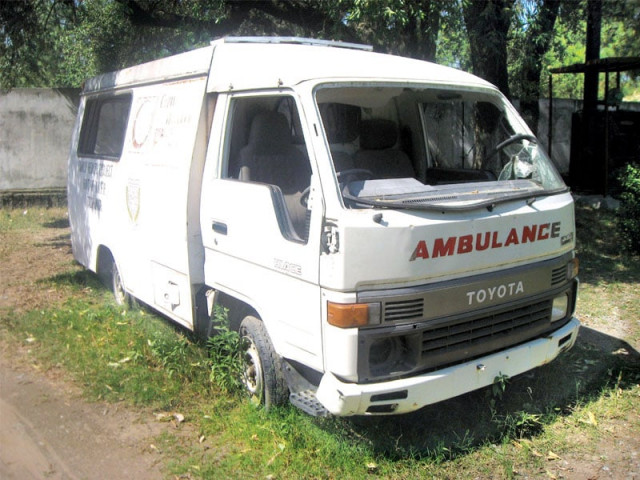Rescue 1122: With funds at disposal, KMC still struggles to bring efficiency
Nearly 800 ambulances operate in the metropolis.

Rescue 1122: With funds at disposal, KMC still struggles to bring efficiency
It has been four years and counting since Sindh began trying to emulate Punjab by structuring an integrated system for ambulance providers in the province.
The rescue 1122 service, which was inaugurated in Karachi in 2008, finds itself in need of a rescue this time. Of the nine ambulances available with the Karach Metropolitan Corporation (KMC), five have remained out-of-order at the Civic Centre for over a year, while the remaining are utilised during events like the Eid Milad-un-Nabi and public processions, said KMC’s senior director of medical services Dr Nasir Jawaid Sheikh.
The city government’s original plan was to start with a fleet of 50 ambulances, and gradually increase that number to 100. However, the plan hit a snag in the form of funding problems after the City District Government Karachi system was abolished.
That problem, however, might just have been dealt by the provincial government, which allocated Rs100 million for the project in its budget for the 2012-13 fiscal year.
But even with the financial problems seemingly out of the way, the city government appears to finds itself in a bind as it realised that it was asking too much of itself to launch an ambulance programme on its own. It has, therefore, decided to regulate existing ambulance service providers in the city and to focus on making the coordinated emergency response system more efficient.
The provision of emergency care services to citizens is the responsibility of the state, said Dr Rasheed Jooma, who is the principal investigator at the Road Traffic Injury Research and Prevention Centre (RTIRPC).
There are nearly four major and as many minor ambulance providers in the city, which have a combined fleet of nearly 800 ambulances, said Dr Jooma. The Edhi Foundation, Aman Foundation, St John ambulance service, Chhipa ambulance service, Al-Mustafa Welfare Trust, Alamgir Welfare Trust, Red Crescent and the Khidmat-e-Khalq Foundation are among the primary emergency service providers in the city.
However, the perceived lack of funds does not appear to be the singular culprit behind the delay. Dr Sheikh recognised the need for increased coordination between hospitals and emergency service providers. “There are times when we have more ambulances at a point of emergency than it is required, which often leads to a fight among them for transporting [victims].”
Dr Junaid Razzak, executive director of the Aman Foundation, commented that there was also a dearth of trained emergency staff in the city. “[Emergency staff] do not know how to handle critically injured patients. [Most] transportation vehicles are also not equipped with life saving equipment.” Dr Sheikh said that the KMC is regularly in contact with emergency providers to sort out these issues. Dr Jooma, however, made it clear that the city administration was expected to financially contribute to some parts of the project, like in the setting up of dispatch centres and coordination points.
Published in The Express Tribune, June 21st, 2012.



















COMMENTS
Comments are moderated and generally will be posted if they are on-topic and not abusive.
For more information, please see our Comments FAQ